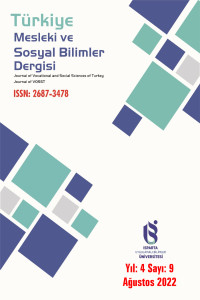Öz
Akış deneyimi, bireylerin algıladıkları zorluk derecesi ile sahip oldukları becerilerin dengede olduğu bir faaliyeti, yoğun bir konsantrasyon altında ve derin bir zevkle gerçekleştirdikleri ve kişi için zaman akışının bozulduğu bir deneyimdir. Bu çalışmanın amacı, pozitif psikoloji alanında sıklıkla çalışılan bireysel akış deneyimi kavramını işyeri ortamında ele alarak, işyerinde daha mutlu, daha neşeli ve daha verimli çalışma ortamının oluşturulması için bir bakış açısı sunmaktır. Bu bağlamda ‘işyeri akışı’nın tanımı yapılarak, akışı tanımlamaya çalışan temel akış modelleri ele alınmıştır. Bireysel akışı kapsayan ancak bireysel akıştan farklı olarak paylaşılan bazı özelliklere sahip olan işyeri akışının temel özellikleri ve günümüze dek yoğun biçimde bireysel olarak ele alınmış akış kavramının, grup akışına uyarlanması sürecinde gerçekleştirilmiş çalışmalar üzerinde durulmuştur. Çalışma, her geçen gün daha da karmaşıklaşan çalışma ortamlarında çalışanların iş akışlarının sağlanması ve çalışandan maksimum verimin sağlanması adına önemli bir katkı sunmaktadır.
Anahtar Kelimeler
Kaynakça
- Adlai-Gail, W. S. (1994). Exploring the autotelic personality. The University of Chicago.
- Aleksić, D., Černe, M., Dysvik, A., & Škerlavaj, M. (2016). I want to be creative, but… preference for creativity, perceived clear outcome goals, work enjoyment, and creative performance. European journal of work and organizational psychology, 25(3), 363-383.
- Aubé, C., Brunelle, E., & Rousseau, V. (2014). Flow experience and team performance: The role of team goal commitment and information exchange. Motivation and Emotion, 38(1), 120-130.
- Bakker, A. B. (2005). Flow among music teachers and their students: The crossover of peak experiences. Journal of vocational behavior, 66(1), 26-44.
- Bakker, A. B. (2008). The work-related flow inventory: Construction and initial validation of the WOLF. Journal of Vocational Behavior, 72, 400-414.
- Csikszentmihalyi, M. (1975). Beyond boredom and anxiety. San Francisco: Jossey-Bass.
- Csikszentmihalyi, M. (1990). Flow: The Psychology of Optimal Experience. New York: Harper & Row.
- Csikszentmihalyi, M. (2014). Flow and the Foundations of Positive Psychology, The collected works of Mihaly Csikszentmihalyi. Springer.
- Csikszentmihalyi, M., & Asakawa, K. (2016). Universal and cultural dimensions of optimal experiences. Japanese Psychological Research, 58(1), 4-13.
- Csikszentmihalyi, M., & LeFevre, J. (1989). Optimal experience in work and leisure. Journal of personality and social psychology, 56(5), 815-822.
- Csikszentmihalyi, M., Abuhamdeh, S. ve Nakamura, J. (2005) Flow, Handbook of Competence and Motivation In Elliot, A. J. ve Dweck, C. S. (Ed.), Chapter 32, Guilford Publications Inc. NewYork.
- Demerouti, E. (2006). Job characteristics, flow, and performance: the moderating role of conscientiousness. Journal of occupational health psychology, 11(3), 266-280.
- Drake-Brassfield, C. (2012). The relationship of flow experience and social influence on employees' job satisfaction and positive mood, Doctoral dissertation, Walden University.
- Guo, Y. M., & Poole, M. S. (2009). Antecedents of flow in online shopping: a test of alternative models. Information Systems Journal, 19(4), 369-390.
- Guzzo, R. A., Yost, P. R., Campbell, R. J., & Shea, G. P. (1993). Potency in groups: Articulating a construct. British journal of social psychology, 32(1), 87-106.
- Hamilton, E., & Hurford, A. (2007, October). Combining collaborative workspaces with tablet computing: Research in learner engagement and conditions of flow. In 2007 37th Annual Frontiers In Education Conference-Global Engineering: Knowledge Without Borders, Opportunities Without Passports , IEEE, T3C-3.
- Hoffman, D. L., & Novak, T. P. (1996). Marketing in hypermedia computer-mediated environments: Conceptual foundations. Journal of marketing, 60(3), 50-68.
- Isaksen, S. G., & Lauer, K. J. (2002). The climate for creativity and change in teams. Creativity and innovation management, 11(1), 74-86.
- Levine, C. L. (2006). Flow and motivation in male ballet dancers, Doctoral dissertation, The Wright Institute.
- Lewis, K., & Herndon, B. (2011). Transactive memory systems: Current issues and future research directions. Organization science, 22(5), 1254-1265.
- Nielsen, K., & Cleal, B. (2010). Predicting flow at work: Investigating the activities and job characteristics that predict flow states at work. Journal of occupational health psychology, 15(2), 180-190.
- Novak, T. P., & Hoffman, D. L. (1997). Measuring the flow experience among web users. Interval Research Corporation, 31(1), 1-35.
- Novak, T. P., Hoffman, D. L., & Yung, Y. F. (1997). Modeling the structure of the flow experience Among Web Users, Abstract for the INFORMS Marketing Science and the Internet Mini-Conference MIT, March 1998.
- O'Leary-Kelly, A. M., Martocchio, J. J., & Frink, D. D. (1994). A review of the influence of group goals on group performance. Academy of management journal, 37(5), 1285-1301.
- Özkara, B. Y., & Özmen, M. (2016). Akış deneyimine ilişkin kavramsal bir model önerisi. Eskişehir Osmangazi Üniversitesi İktisadi ve İdari Bilimler Dergisi, 11(3), 71-100.
- Salas, E., Cooke, N. J., & Rosen, M. A. (2008). On teams, teamwork, and team performance: Discoveries and developments. Human factors, 50(3), 540-547.
- Sawyer, K. (2015). Group Flow and Group Genius. NAMTA Journal, 40(3), 29-52.
- Seijts, G. H., & Latham, G. P. (2000). The effects of goal setting and group size on performance in a social dilemma. Canadian Journal of Behavioural Science/Revue canadienne des sciences du comportement, 32(2), 104-116.
- Snow, K. Y. (2010). Work relationships that flow: Examining the interpersonal flow experience, knowledge sharing, and organizational commitment. The claremont graduate university, California.
- Walker, C. J. (2010). Experiencing flow: Is doing it together better than doing it alone?. The Journal of Positive Psychology, 5(1), 3-11.
- Yeşiltaş, M. D., & Türk, M. (2017). İş Stresinin Çalışanların İş Akış Deneyimleri Üzerindeki Etkisi. Journal of International Social Research, 10(54), 935-941.
Ayrıntılar
| Birincil Dil | Türkçe |
|---|---|
| Konular | İşletme |
| Bölüm | Araştırma Makaleleri |
| Yazarlar | |
| Yayımlanma Tarihi | 29 Eylül 2022 |
| Gönderilme Tarihi | 20 Haziran 2022 |
| Yayımlandığı Sayı | Yıl 2022 Sayı: 9 |

